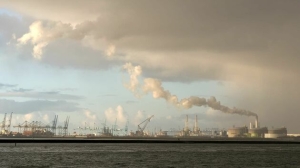


(Posted on 17/04/25)
Greenhouse gas emissions at companies in the port decreased by 1.7 Mton (8%) in 2024 compared to 2023. This time, unregistered emissions and other greenhouse gas emissions were also included. This brings the total greenhouse gas emissions from companies in the port to 19.2 Mton in 2024.
The reduction is due to lower industrial production and the increased generation of sustainable energy in the Netherlands. Actions such as the closure of coal plants, the launch of Porthos and the use of renewable energy and raw materials in industrial production are expected to result in a further decline. These are expected later this decade.
All together, the five power plants in the port emitted 0.7 Mton (12%) fewer greenhouse gases in 2024 than in 2023. This is primarily due to a decline in electricity generation from coal. In the Netherlands, emissions from the electricity sector decreased by 3% thanks to continued growth in electricity generation from wind and solar power. Industry in the port of Rotterdam emitted 1 Mton (7%) fewer greenhouse gases in 2024 than in 2023.
As in the previous year, production in the chemical industry did not recover in 2024, and emissions continued to decline by 0.1 Mton (2%). The supply and processing of crude oil in the port declined in 2024, resulting in 0.5 Mton (6%) fewer emissions at refineries. In the other sectors in the port, emissions in 2024 were 0.4 Mton (29%) lower than in 2023, as the waste incineration plant could only be restarted in October 2024 following a fire the previous year.
The total emissions of 19.2 Mton in the port industrial complex comprises the CO2 emissions from the 42 ETS companies (18.1 Mton CO2 emissions), 22 non-ETS companies subject to registration (0.23 Mton CO2 emissions), unregistered emissions from companies in the port (0.75 Mton CO2 emissions) and the other greenhouse gas emissions from companies in the port (0.12 Mton CO2 equivalents). This year, the Port of Rotterdam Authority has retroactively included other greenhouse gases and CO2 emissions from unregistered emissions from companies for the first time. For the unregistered emissions, the Port of Rotterdam Authority relies on an estimate provided by the research and consultancy firm CE Delft.
CE Delft recently advised the Port of Rotterdam Authority on the calculation of greenhouse gas emissions in the port, covering both companies based in the port and transport linked to the port. The study has provided several recommendations for improving the mapping of greenhouse gas emissions in the port. These have now been incorporated into the reporting of emissions from companies in the port. The 2025 annual report will also include recommendations regarding transport. For more information on monitoring the port’s greenhouse gas emissions, see our website (in Dutch).
Nectar Sierra Leone Bulk Terminal (NSBT) is celebrating the operational launch of a new third berth... Read more
Following the UK government’s passing of an emergency law to take control of British Steel, vital... Read more
Trammo, OCI and James Fisher Fendercare have successfully conducted an ammonia bunkering pilot between... Read more
BMF Port Burgas AD (BMF), one of Bulgaria’s largest port operators, has ordered two Generation... Read more
Abu Dhabi based AD Ports Group a leading global enabler of trade, transport, industry, and logistics... Read more
Euroports has announced the renewal of the concession for Terminal Rinfuse Venezia (TRV) at Porto Marghera... Read more
Contributing to the commitment of achieving net zero emissions by 2050, the Panama Canal authority has... Read more
The Saguenay Port Authority in Quebec has ordered a Konecranes Gottwald ESP.6B Mobile Harbor Crane for... Read more
North Sea Port Supervisory Body has appointed Cas König as the port authority's new CEO. Kö... Read more
After 19 years at the helm of the Port of Trois-Rivières and a career rich in major projects,... Read more